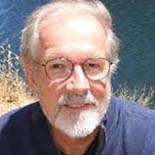
Paul Hoover (born 1946) is an American poet and editor.
DARKNESS OF THE SUBJUNCTIVE
Paul Hoover
If it hadn’t rained, we would’ve gone to the beach.
— Phuc Tran
If we were in infinity, we would be everywhere,
even inside ourselves, as taste resides in the walnut,
and the walnut resides in the shell.
Then we would thrive inside the subjunctive,
where nothing happens but dreams of being,
as paradise dreams of its inferno,
the inferno of cotton candy.
If only the world had ripened, like a pear,
it might have melted the mirror in me,
delivering its softness to the hard road of the mind,
sixty miles from town.
And if our grammar were even to our heat,
comma, conditional phrase, comma,
we’d be addicted to the sentence,
sentenced to an exile that sees, hears, and thinks,
and is often mistaken for love.
Trees are chronologies;
every leaf shines, and in turning over it winks an eye:
if, if, and then. The world is possible meaning;
the world is possible, meaning:
I might have been an elf, had I been elfin.
But I am not an elf. I am a giant with tiny hands:
would, could, and should.
Had I been winged, I might have flown
from industrial field to pastoral alley
on great woolen wings, with the blue face of a bee.
Then it would have been said, “He is repairing to his persona,”
or “He is retiring to his future.”
I’ll copy this by way of the stars, reflective.
Get back to me by facsimile or dream of climbing a night ladder
to the place of ideal size, near a town of simple affection.
If we had been born, lived our lives, and died,
we might have existed. On the side of darkness, infinity;
on the other, a sixty watt bulb.
====
HAVE YOU EATEN OF THE TREE?
Paul Hoover
And the fourth river is the Euphrates
The first day was a long day
and the first night nearly eternal.
No thing existed, and only One was present
to perceive what wasn’t there.
No meaning as we know it;
difference was bound in the All.
On the first day, water,
on the second day, land,
on the third day, two kinds of light,
one of them night.
On the fourth day, laughter,
and darkness saw it was good.
But when God laughed,
a crack ran through creation.
On the fourth night, sorrow,
staring away from heaven,
torn in its ownness.
No evidence then of nothing,
but worlds upon worlds,
underwritten, overflowing:
the worlds of fear and of longing,
lacking in belief,
and the pitiful world of love,
forever granting its own wishes.
Out of dust, like golems,
God created man and woman,
and cast them into chance.
And man was subdued in those days.
All that could leap, leapt;
all that could weep, wept.
First of all places, Eden;
last of all places, Cleveland;
and a river flowed out of Eden,
inspiring in the dry land
a panic of growth and harvest season.
The newly formed creation
took from flesh its beast
and from each word its sentence.
And early loves and hatreds blew
from thistle to thorn.
Each thing that God created,
he placed before man
so that he may name it:
cloudbank, hawk’s eye, lambkin,
and for each thing that man made,
God provided the name:
andiron, Nietzsche, corporation.
All speak of pain
subtle in its clamor,
as when the child, dying,
sinks into its skin
as under public snow.
Heartrending, each termination;
God-shaken, each beginning.
At the dawn of smoke,
pungent as creation,
the long chaos rises over these trees.
For we opened our eyes in Eden,
with the taste of fruit on our lips.
(Genesis)